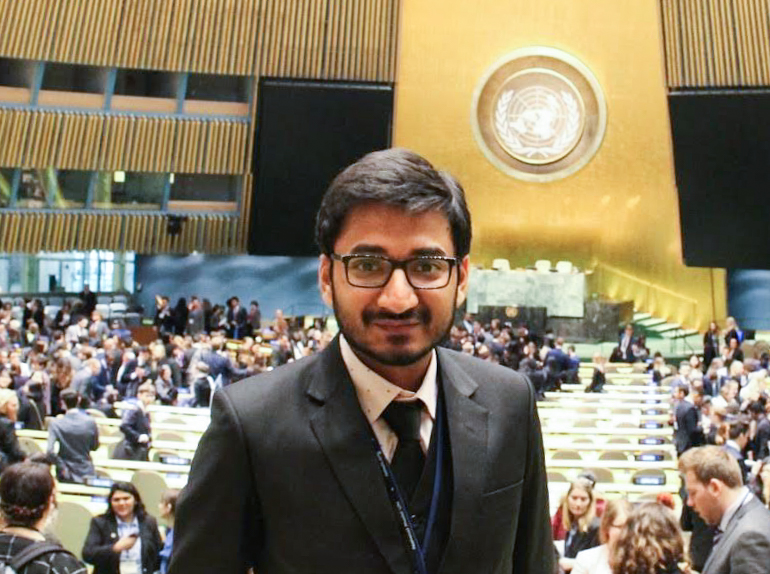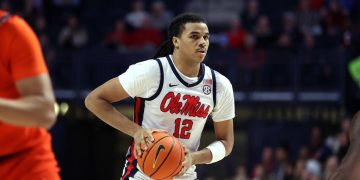
When Rohan Agrawal received news that he was one of four U.S. students selected to attend the Committee on World Food Security conference at the United Nations headquarters in Italy, he called his parents — even though it was 2 a.m. back home in India.
“Dad,” he said. “I’m going to Rome!”
Agrawal received a Planet Forward scholarship in June to attend the conference. Planet Forward is an initiative of the Center for Innovative Media at the George Washington University School of Media and Public Affairs that rewards college students involved in environmental storytelling.
Agrawal spoke at the U.N. General Assembly to the Model U.N. delegates in New York in March.
A junior computer science major minoring in international relations and mathematics, he said has always cared about the environment because of how he was raised in Indore, India.
“I always had a service element inside me,” Agrawal said. “I have to give back to society in some way or the other.”
He grew up witnessing class disparity, seeing other children who did not have the resources to go to school and had to ask for money to buy food.
“I didn’t want the world to suffer the same,” he said.
It was important for Agrawal to get scholarships to attend Ole Miss, which he discovered online in high school. He was impressed with the university’s options available for international students and the university’s status as an R1 research institution.
Agrawal said he was anxious about applying for the scholarship, but after attending the World Food Security Summit in October, he was even more passionate about his future. Besides getting to speak with people like María Juliana Ruiz Sandoval, the first lady of Colombia, and the directors of the food and climate divisions of the Food and Agriculture Organization of the United Nations, he learned that people are hopeful about the role technology will play in helping the environment.
Computer science is a significant part of school curriculum in India, Agrawal said.
While he learned how to code in the fifth grade, he said he noticed that Mississippi does not have much focus on computing and technology.
Inspired by a coding club in Water Valley, Agrawal presented Dawn Wilkins, professor and chair of computer and information science, with the idea for “Code Miss,” an organization where he and other computer science students teach middle and high school students in Lafayette County how to code.
“I think coding — or computer programming, in general — is one of the most important skills of the 21st century,” he said. “And I thought there was a need. So, if schools are not able to give them that, I will.” The club now has 17 students and 15 mentors.
Agrawal said he is also looking to leave a lasting impact on the University of Mississippi. He is developing a “dashboard” that can output information such as how much energy, water or natural gas is used and produced on campus. His idea was influenced by computer science students at Oregon State University who have developed similar technology.
“If tech people are working that much towards sustainability,” Agrawal said, “I think that’s my responsibility to do something towards the environment,” Agrawal said. “I think that’s my small contribution to the university.”
Agrawal is working with the university’s Facilities Management Office, which handles the university’s data on energy and water, during the developmental stage of the dashboard. The office likes the idea so much that they intend to use it even after Agrawal graduates.
“Certain issues like climate change,” Agrawal said, “I think people don’t discuss it on the level that it should be discussed and talked about so that it can induce actions among people.”
Agrawal has learned more about politics around climate change and how society confronts it. He thinks that adding discussions about climate change to the EDHE curriculum or freshman orientation would be a step in the right direction.
“He’s very much a student of curiosity,” Matthew Hendley said. Hendley, one of Agrawal’s best friends, recounted the time he taught Agrawal how to drive. Although the first attempt wasn’t successful, after a summer away, Hendley came back to find that Agrawal had greatly improved his driving skills, eventually getting his permit and license.
“That just shows his character right there,” Hendley said, “He’s so driven and so passionate about the things that he’s interested in that it kind of rubs off on you.”
Tim Dolan, director of the Office of National Scholarship Advisement, helps connect students to scholarships and other competitive opportunities, and he led Agrawal to the Planet Forward scholarship.
“It has really opened doors to let people know what he’s able to do,” Dolan said. “He’s really on the cutting edge of how people are thinking about using technology in innovative ways.”
He said he thinks Agrawal will continue to do great things in computer science and believes he has a good chance of becoming a finalist for the Rhodes Scholarship, which Agrawal plans to apply for next year.
“I didn’t come with a specific plan in mind,” Agrawal said. “I just knew that I have to do something big over here.”


























